Russia's full-scale invasion in 25 photos from Ukrainska Pravda

Ukrainska Pravda’s journalists have followed the developments in this war since Russia’s full-scale invasion on 24 February 2022, travelling to the sites of key events: the liberation of Kyiv, Chernihiv and Kharkiv oblasts and of the city of Kherson; the defence of Donetsk and Luhansk oblasts; Iranian drone attacks on Kyiv; mourning the fallen heroes and civilian victims of this war; attempts to evacuate pets and animals under shelling.
We have followed the Armed Forces of Ukraine and the servicemen and -women defending the toughest stretches of the front and the civilians refusing to leave those areas.
Ukrainska Pravda has focused particular attention on Donetsk and Luhansk oblasts, parts of which have been a battlefield for the past eight years. Half of the photographs below were taken in Bakhmut, Siversk, Soledar and near Sloviansk.
Here we have gathered together 25 photos which capture the faces and events that epitomise the first year of Russia’s full-scale invasion in Ukraine.
March 2022, Lviv Oblast
Fighters from the Aratta Battalion of Ukraine’s volunteer army are training in Lviv Oblast, wooden dummy guns in their hands, during the first weeks of the full-scale invasion. Voluntary exercises were taking place all over Ukraine.
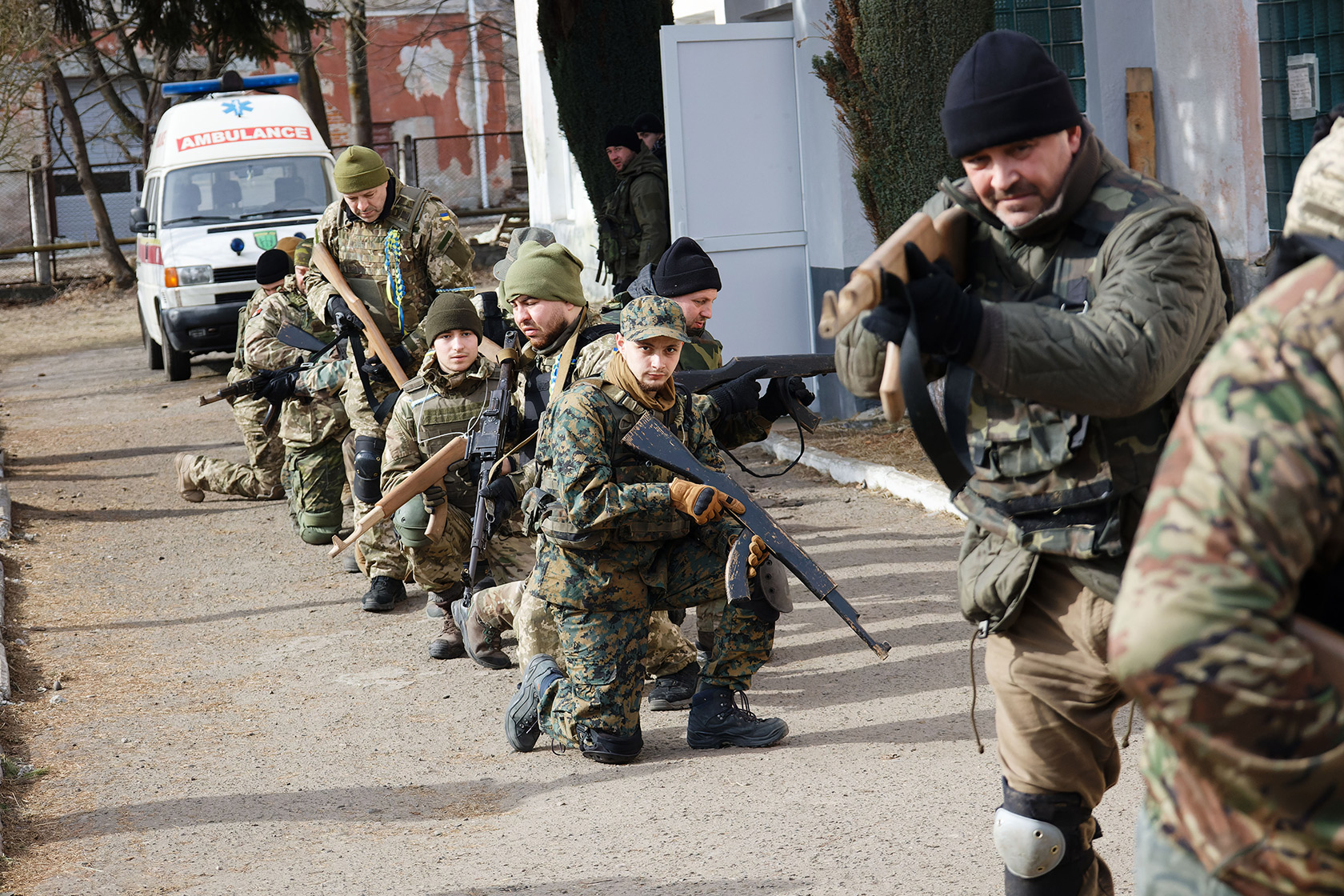
4 April 2022, Bucha (Kyiv Oblast)
Three days after Kyiv Oblast was liberated, Ukrainian President Volodymyr Zelenksyy visited Bucha, accompanied by his security detail and Kyrylo Tymoshenko, Deputy Head of the Office of the President.
The city witnessed many of this war’s horrors: after Kyiv Oblast was liberated, evidence of torture and civilian killings were found there.
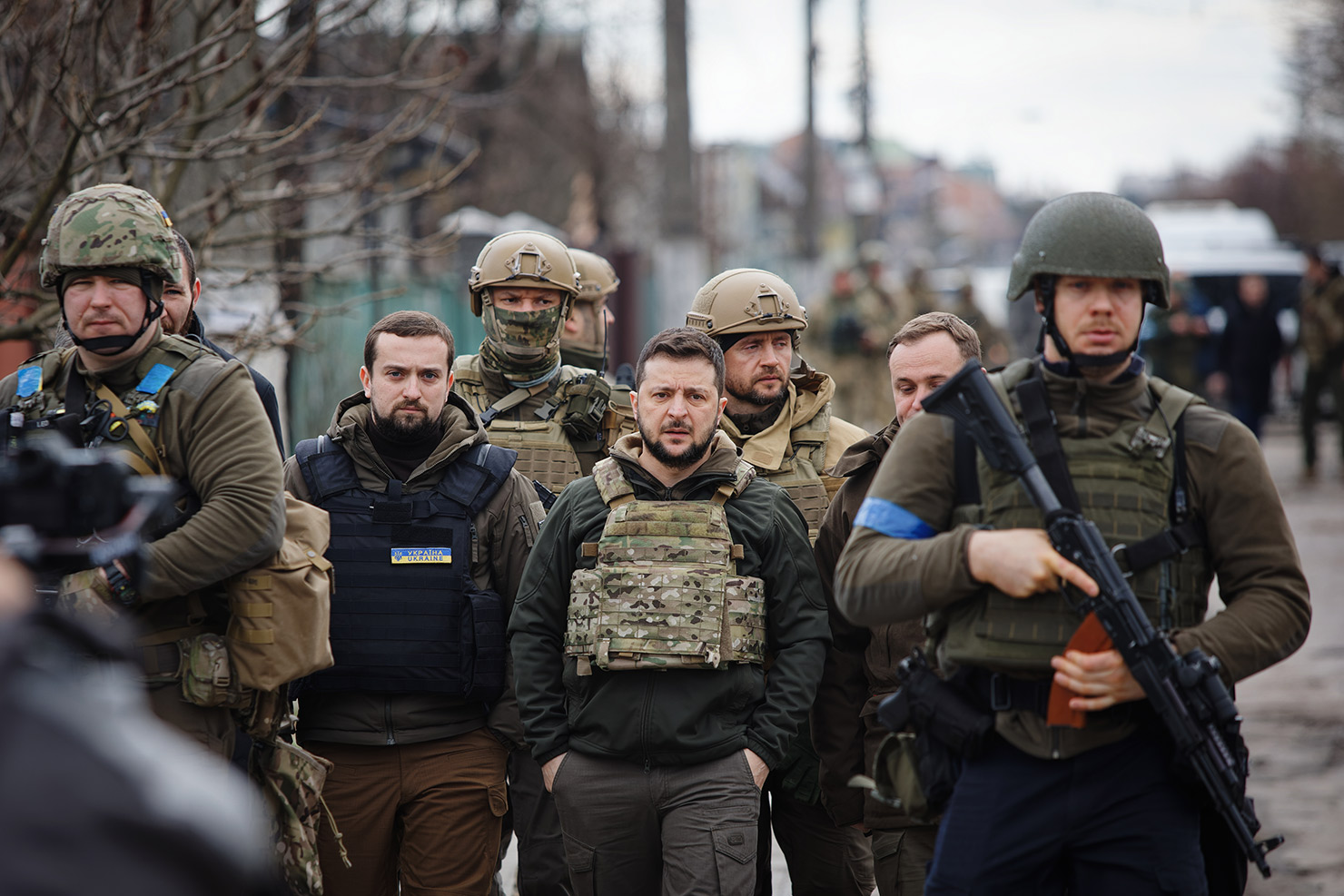
4 April 2022, Bucha (Kyiv Oblast)
The photograph shows Vokzalna Street, where Ukrainian artillery units destroyed a column of Russian military vehicles and equipment in the final days of February 2022. Bucha has now returned to peaceful life: on 12 December, a Christmas tree was installed in one of the city’s squares.

4 April 2022, Bucha (Kyiv Oblast)
The body of a Bucha resident with his hands tied with white cables is carried out from the basement of a Promenystyi children’s camp, where Russian forces set up a torture chamber during the city’s occupation.
The mutilated bodies of five men were removed from that basement. One of them had a picture of an eight- or ten-year-old girl in his pocket, the man’s daughter or granddaughter.
A total of 637 civilians were killed in Bucha, or one out of six city residents who remained there under occupation. Over a hundred of those killed were buried in a mass grave near the St Andrew the Apostle Church.
Six months later, another mass grave would be found near the liberated city of Izium in Kharkiv Oblast.
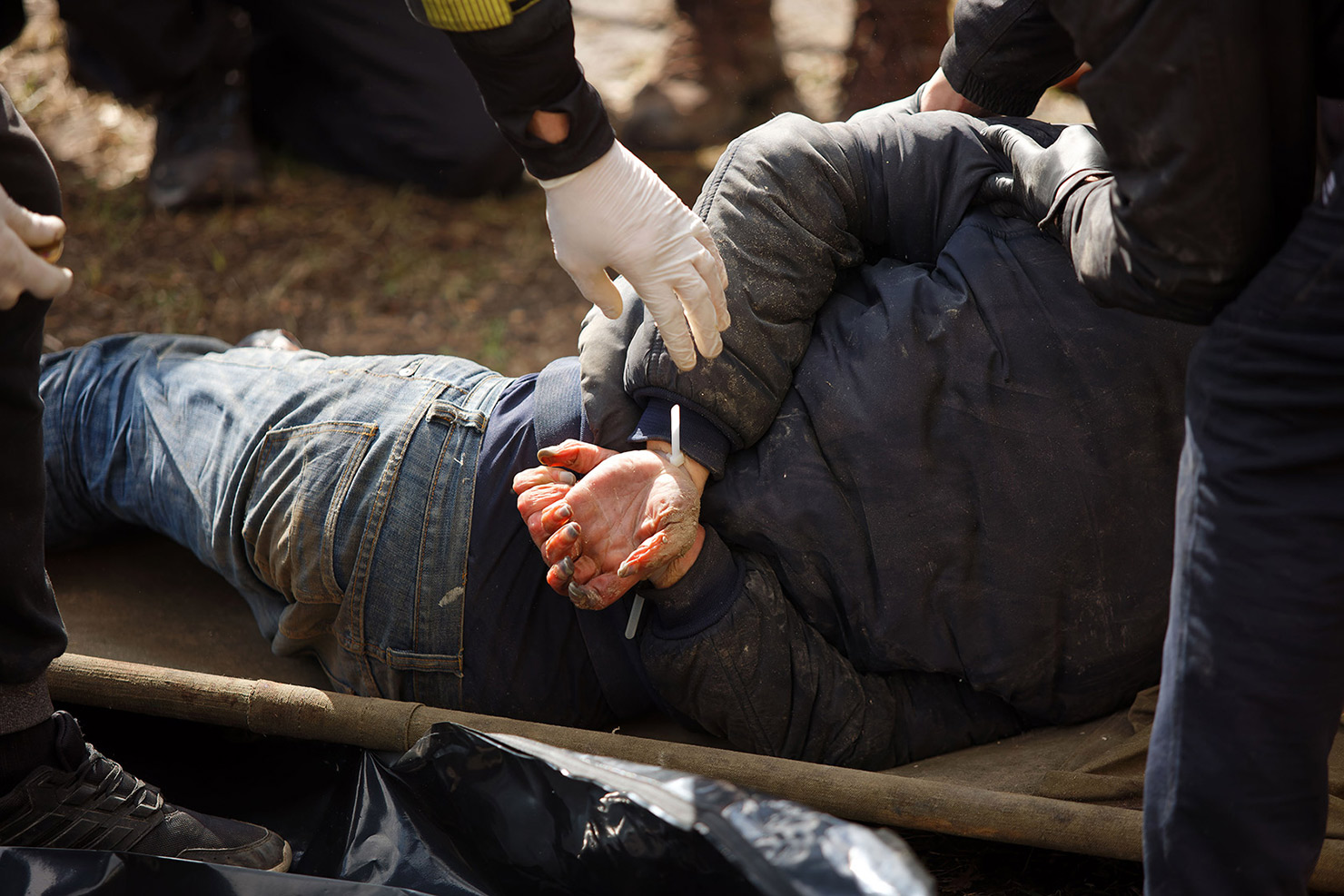
April 2022, Hostomel (Kyiv Oblast)
Remnants of an Antonov An-225 Mryia, an iconic Ukrainian cargo aircraft and one of the biggest and most powerful planes in the world, at Hostomel airfield. Bucha Mayor Anatolii Feforuk said that the Mriya was destroyed on the first day of Russia’s full-scale invasion.
The state-owned company Antonov has begun building a new An-225 at a secret facility. In July 2022, the aircraft was 30% ready. The cost of its construction is estimated at 500 million euros.
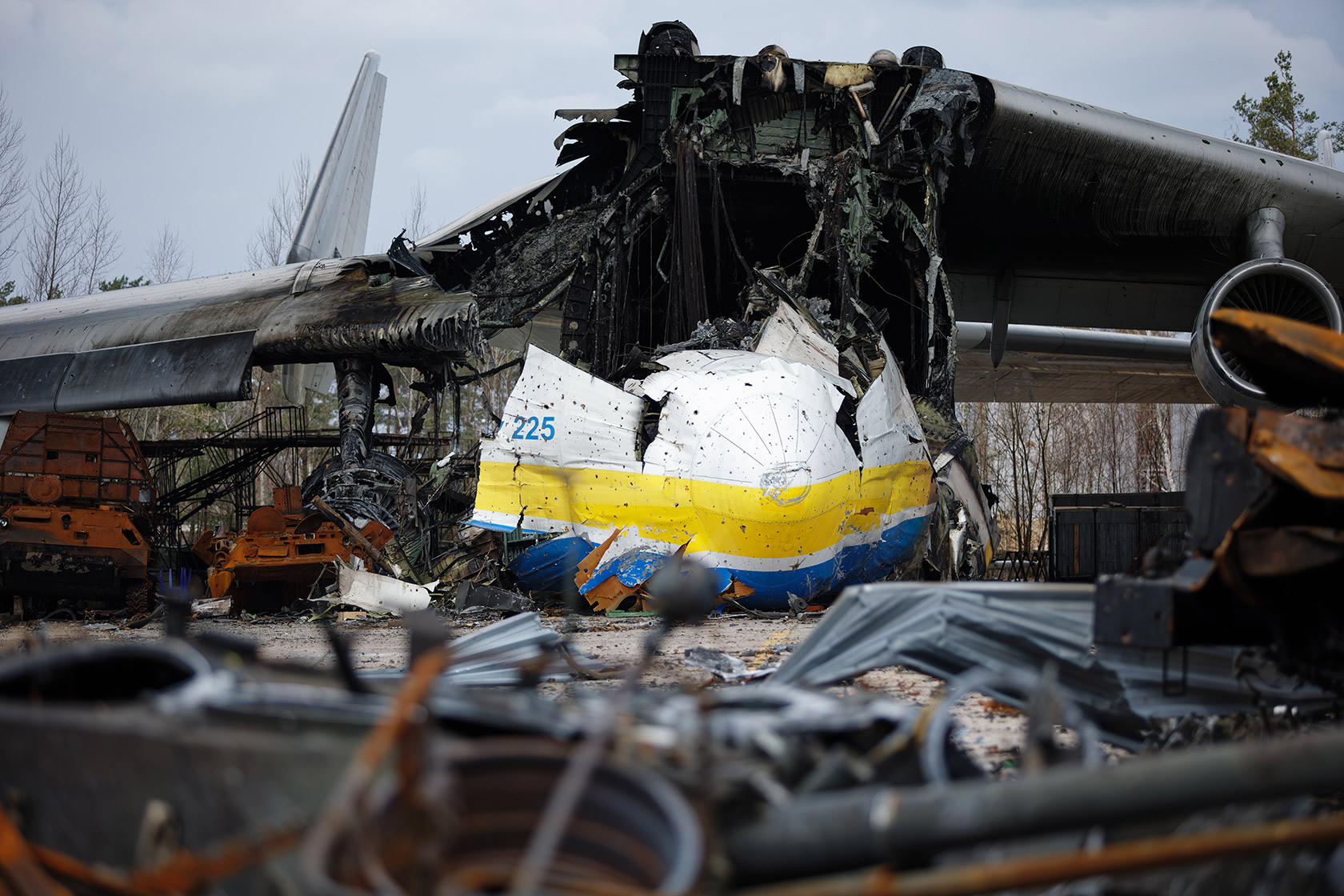
April 2022, Novoselivka (Chernihiv Oblast)
An elderly woman pushes a bicycle along a ravaged street in the village of Novoselivka in Chernihiv Oblast. Russian aircraft dropped multiple bombs on the village in mid-March.
Russian forces planned to use Chernihiv and Sumy oblasts as "corridors" to Kyiv, which they expected to capture during the first three days of the February invasion. The city of Chernihiv is currently believed to be a possible target in the event of an offensive from Belarus.
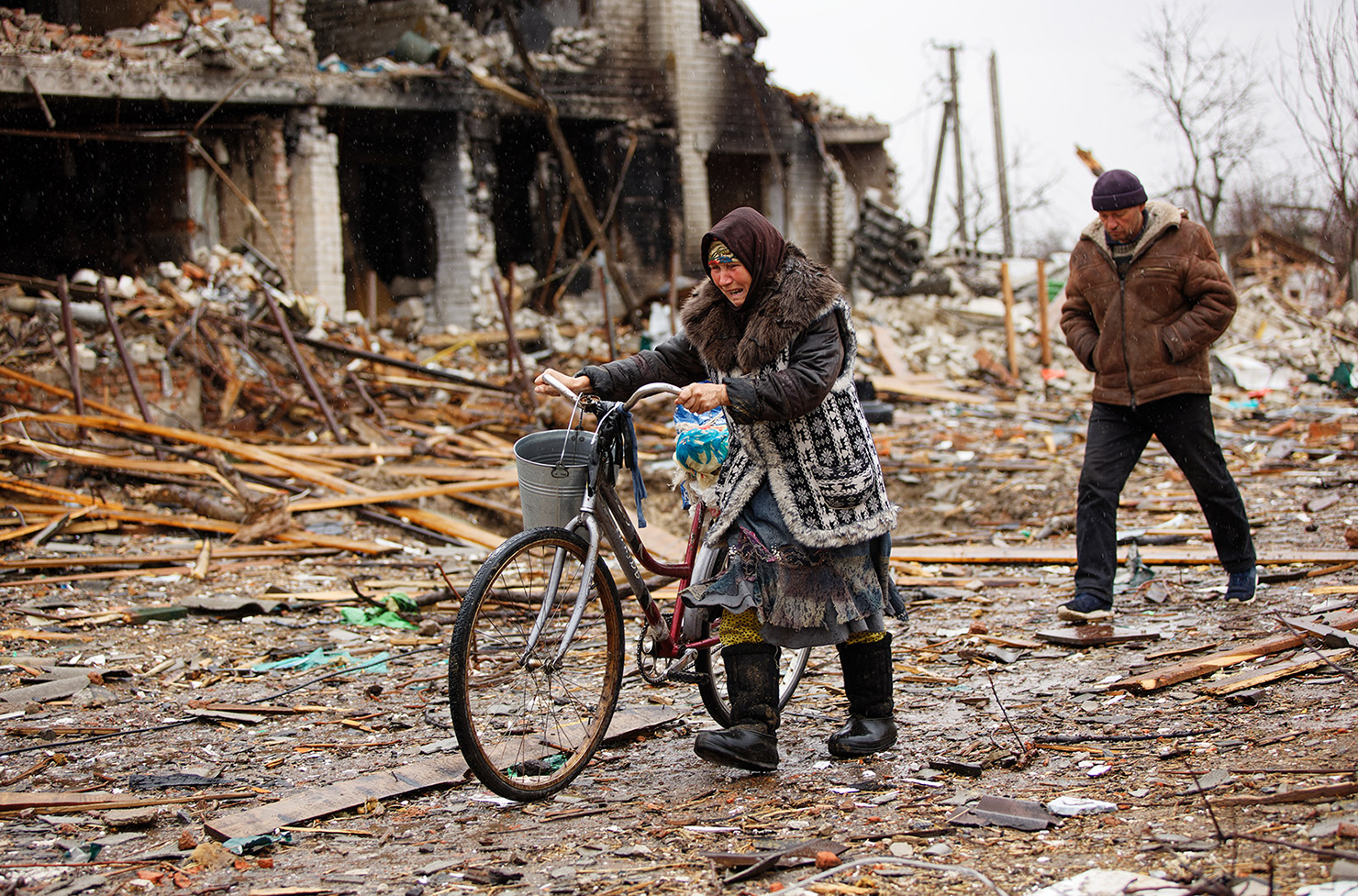
April 2022, Borodianka (Kyiv Oblast)
A teddy bear rests in the rubble of an apartment block in Borodianka destroyed in a Russian airstrike.
The city became a symbol of Ukraine’s resilience after the liberation of Kyiv Oblast.
A kitchen cabinet, miraculously intact, was spotted amid the ruins of one of the destroyed buildings; later, someone noticed a rooster figurine manufactured at the Vasylkiv Majolica Plant on top of that cabinet. The prices for majolica from Vasylkiv on OLX, one of Ukraine’s largest online ad and commerce platforms, have never been as high as in April 2022.
Nine months after the liberation of Borodianka, a city which counts only 12,000 residents, has become the site where the British street art artist Banksy created two of his graffiti.
One depicted a young gymnast balancing atop a ruined building; the other, a little boy throwing a man in a black-belted kimono, resembling Vladimir Putin, to the ground.
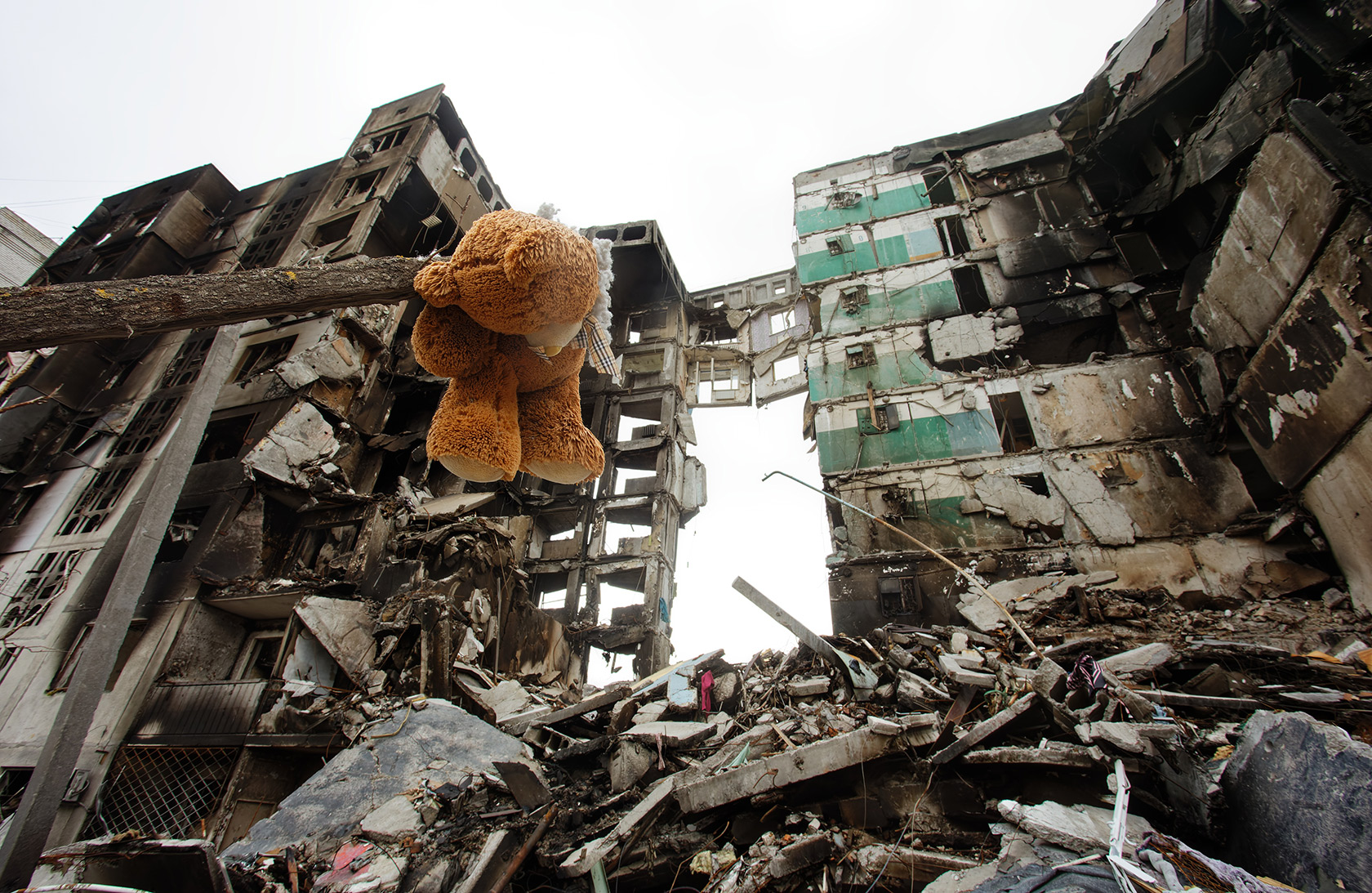
April 2022, Borodianka (Kyiv Oblast)
A "wounded" but not destroyed monument to Taras Shevchenko on Borodianka’s central square, another symbol of Ukraine’s resilience in this war.
Shevchenko and his legacy also survived the Russian occupation in other parts of Ukraine. Six months after the liberation of Borodianka, Ukrainian forces found an excerpt from Shevchenko’s poem ‘Kavkaz’ (Caucasus) after they ripped away a poster depicting a Russian flag during the liberation of Balakliia, Kharkiv Oblast.
The poem had the following lines: "Keep fighting – you are sure to win! For God is on your side! Truth, glory and sacred power are on your side!"
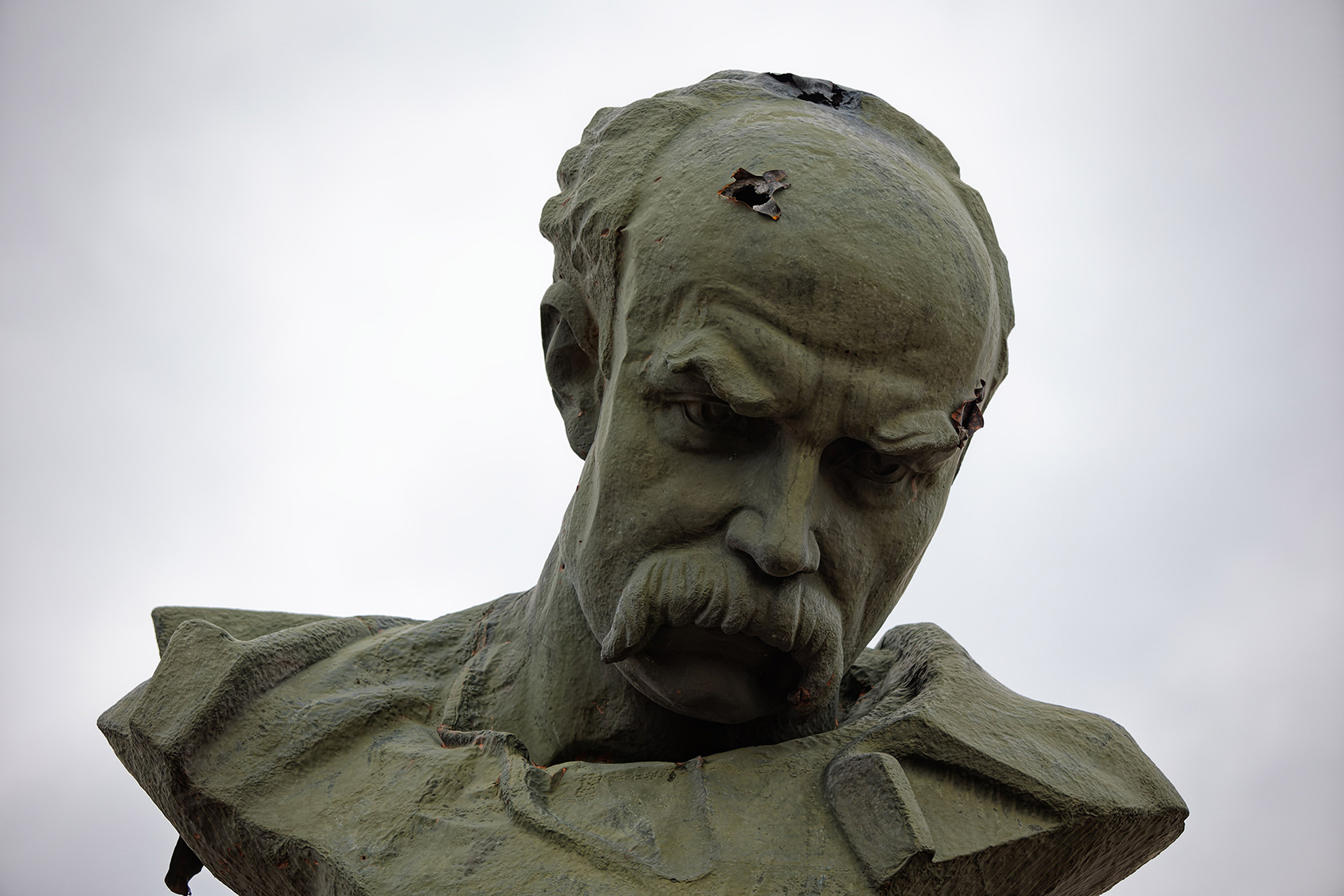
May 2022, Odesa (Odesa Oblast)
The funeral of Valeriia Hlodan, her three-month-old daughter, and her mother, all three of whom were killed in a Russian missile strike on a residential building in Odesa on 23 April, Holy Saturday. The terrorist state claimed the lives of three generations of women in the family on the eve of Easter.
The tragic deaths were reported by Valeriia’s husband, who was spared because he had left the house to go to the store shortly before the attack.
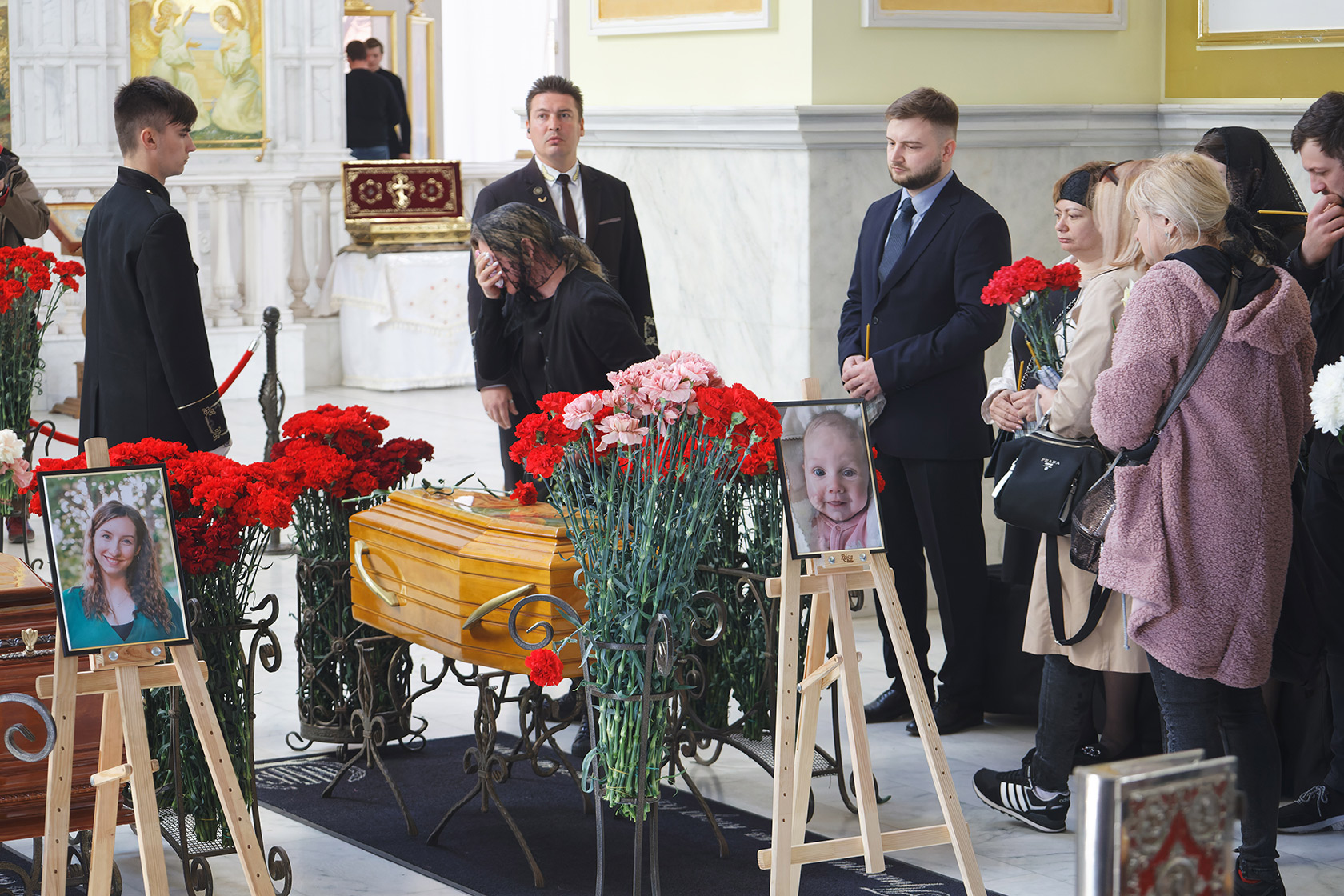
July 2022, Siversk (Donetsk Oblast)
A Siversk resident carries several stale loaves of bread home; she received the bread from providers of humanitarian aid. None of the bakeries in Donetsk Oblast are operating because the gas supply has been cut off; bread is delivered to frontline cities, towns and villages all the way from the city of Dnipro.
When this photograph was taken, Russian forces were some 8–10 kilometres to the north of Siversk, right on the Siverskyi Donets River. The city was constantly being shelled and endured relentless airstrikes.

July 2022, Siversk (Donetsk Oblast)
A Siversk resident is arguing with Ukrainian soldiers, accusing them of shelling the city and blaming them for the city’s destruction. The soldiers from the Ukrainian Armed Forces explain that the opposite is true, that they are trying to push the Russian forces back in order to protect the city from Russian artillery shelling.
That is why Ukrainian artillery reverberated so loudly throughout the city.
Siversk lost all semblance of "normal life": regular attacks and shelling interrupted communications and mobile service; disruptions to other utilities forced people to prepare food in their yards and basements.

July 2022, Siversk (Donetsk Oblast)
Handmade wooden crosses erected over impromptu graves in Siversk. The two people buried there were 52 and 53 years old. Another grave was found in the vicinity of these two.
Such makeshift gravesites usually appear in frontline cities where the intensity of shelling makes it dangerous to leave the basements where civilians often take shelter. That’s why those who were killed are buried in yards and in trenches. Sometimes bodies are just covered with pieces of metal.
Several months later, similar gravesites would begin to appear in the city of Soledar, some 30 kilometres to the south of Siversk.
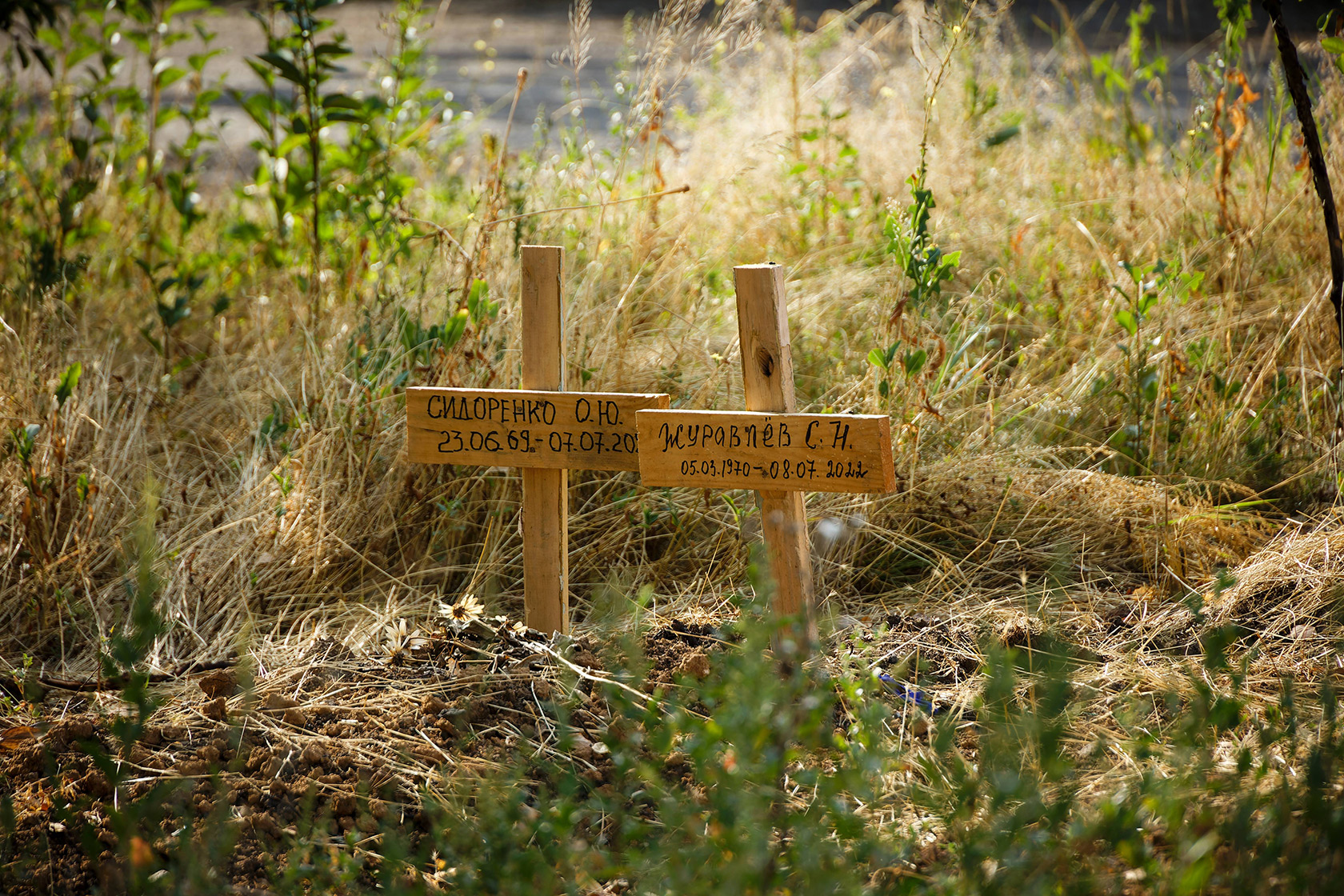
July 2022, Bucha (Kyiv Oblast)
Volunteers from the volunteer territorial hromada group in Bucha during training. [A hromada is an administrative unit designating in this case, the village of Myropillia and its adjacent territories - ed.].

26 August 2022, Soledar (Donetsk Oblast)
In late August, Russian forces attempted to storm the city of Soledar in Donetsk Oblast; shells criss-crossed the city, setting fire to dry grass near the road connecting Bakhmut and Siversk. The area was enveloped in smoke.
The Russians made only minimal gains in the five months of their repeated attempts to capture Soledar. The city marks the northernmost limit of the Bakhmut front and the route taken by the Russian occupation forces to approach and encircle the city of Bakhmut.

August 2022, Donetsk Oblast
Maksym ‘Maiiak’ Lutsyk, a soldier from the Svoboda (Freedom) Battalion that is part of the 4th Emergency Response Brigade of the National Guards of Ukraine, is sitting down at a position in the village of Zaitseve, in the vicinity of the Russian-occupied city of Horlivka.
Zaitseve has been divided between the Ukrainian and the Russian armies since 2014 and has been considered a relatively quiet part of the front since then. However, 10 days after the visit by the Ukrainska Pravda journalists, the Russian army renewed its assault on the village with new force. Zaitseve is currently fully occupied by Russian forces.
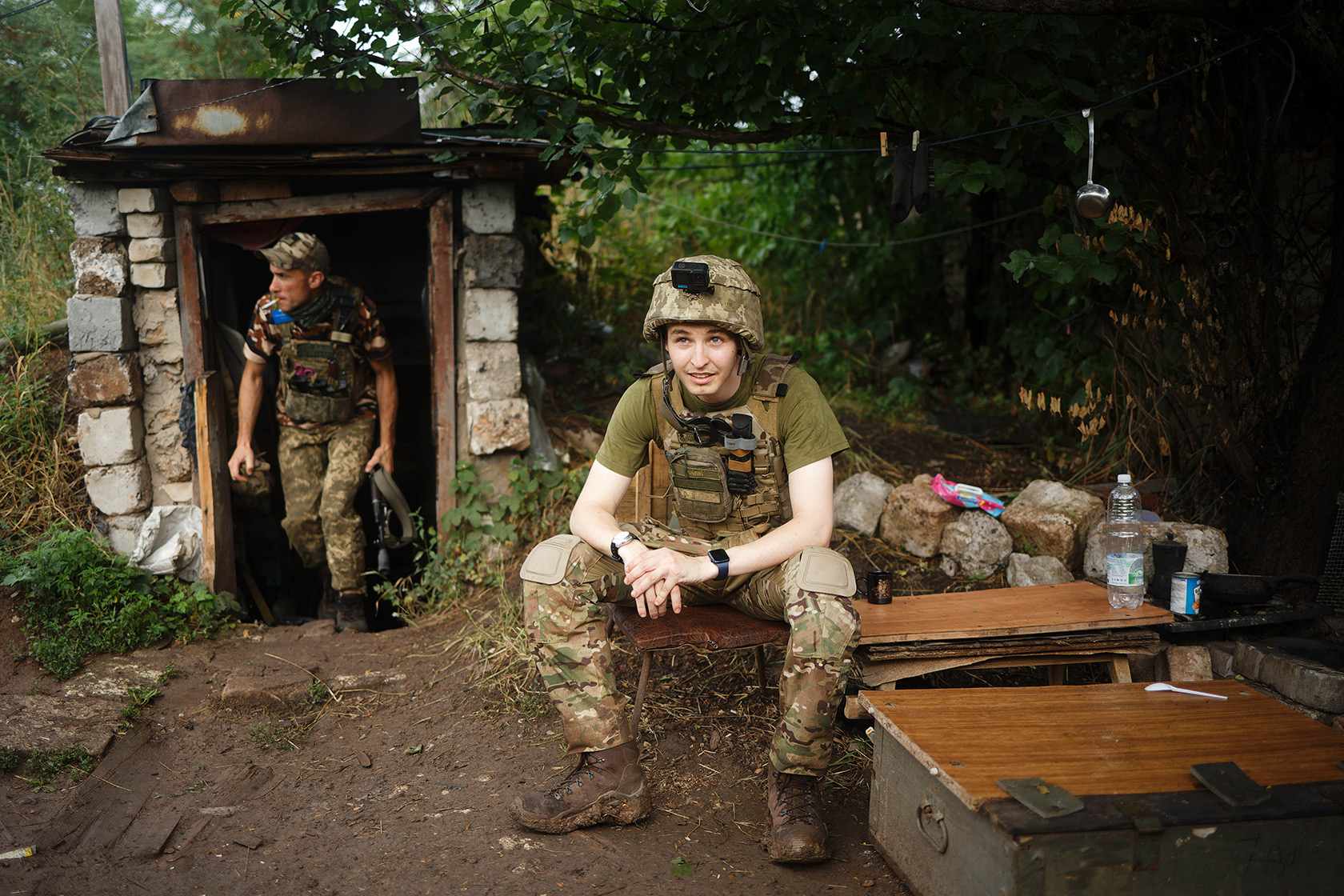
Early August 2022, Bakhmut front
The crew of the 2S1 Gvozdika (Carnation) self-propelled artillery gun from the 58th ‘Ivan Vyhovskyi’ Motorised Infantry Brigade are setting out on their deployment to a site near Bakhmut. Another self-propelled gun follows them.
Several moments after this picture was taken, the convoy’s commander, who goes by the name Baikal, issued the following order: "Fire volley 333 for Kostiantyn Bielov, who was killed while defending Ukraine’s freedom in Kharkiv Oblast!" Four loud bangs resounded in the air.
Russian forces gradually ramped up their offensive on Bakhmut following the occupation of Luhansk Oblast, starting with Russian mortar-launched bombs hitting the city in August. Yet mobile service and other communications, as well as grocery stores and even street food stalls continued to operate.
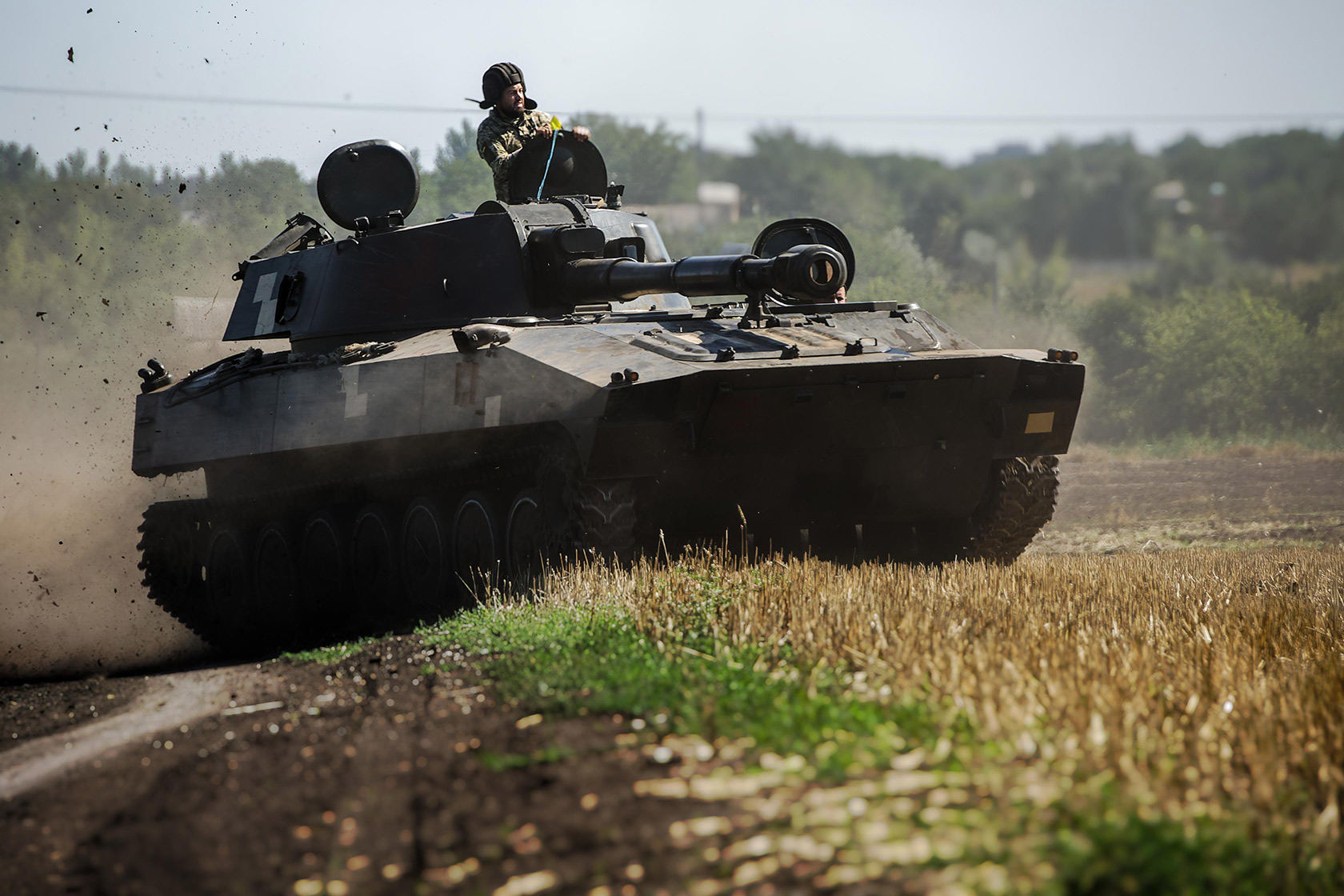
Late August 2022, Bakhmut
Utility service workers in Bakhmut are repairing waterworks after a Russian strike on the city centre. The crater resembles those left by air-dropped bombs. The humanitarian situation in Bakhmut continues to deteriorate.
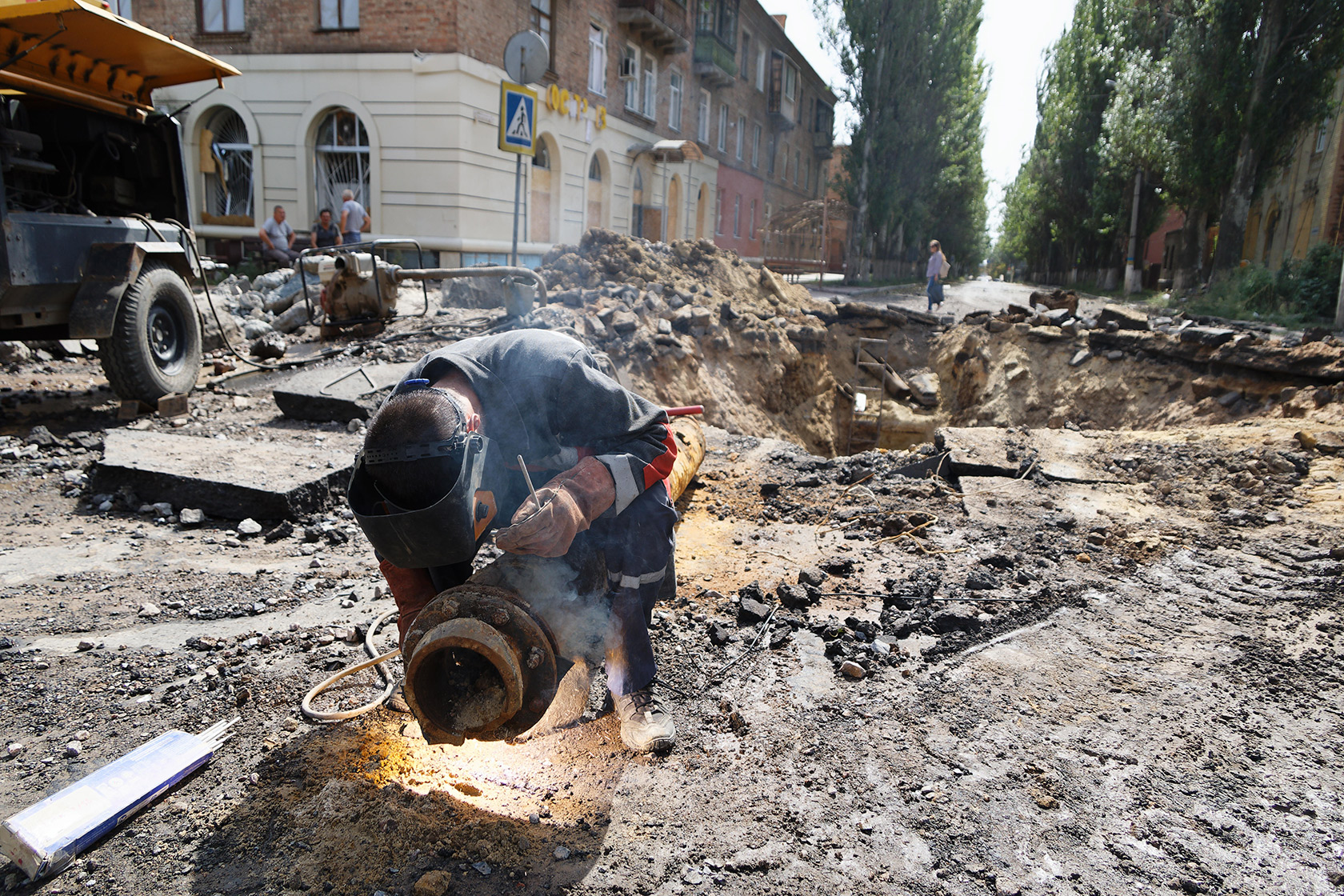
24 August 2022, Ukraine’s Independence Day, Donetsk Oblast
Kateryna and Vitalii, volunteers from Vetmarket, a civil society organisation, are evacuating wounded and abandoned animals from Bakhmut against the backdrop of constant explosions. The majority of the animals come from local residents, who find the animals, feed them and give them shelter, and then call the volunteers to pick up the cats and dogs.
Kateryna and Vitalii then take the animals to veterinary hospitals for treatment, to shelters, or straight to people who want to adopt them.
Several months after this picture was taken, Kateryna told Ukrainska Pravda that the Russians "ate all the animals in Yampil," showing us photos of a private zoo which has not survived the Russian occupation.

Late August 2022, Donetsk Oblast
Soldiers who go by the names Pisnia (Song) and Baton (Loaf), both from the General Kulchytskyi Battalion, are talking near Sviati Hory (Holy Mountains), a national nature park in Donetsk Oblast.
Ten days after the photo was taken, the battalion joined other units to mount a counteroffensive and liberate the city of Sviatohirsk, which had been forced by Russian artillery to retreat since early June.
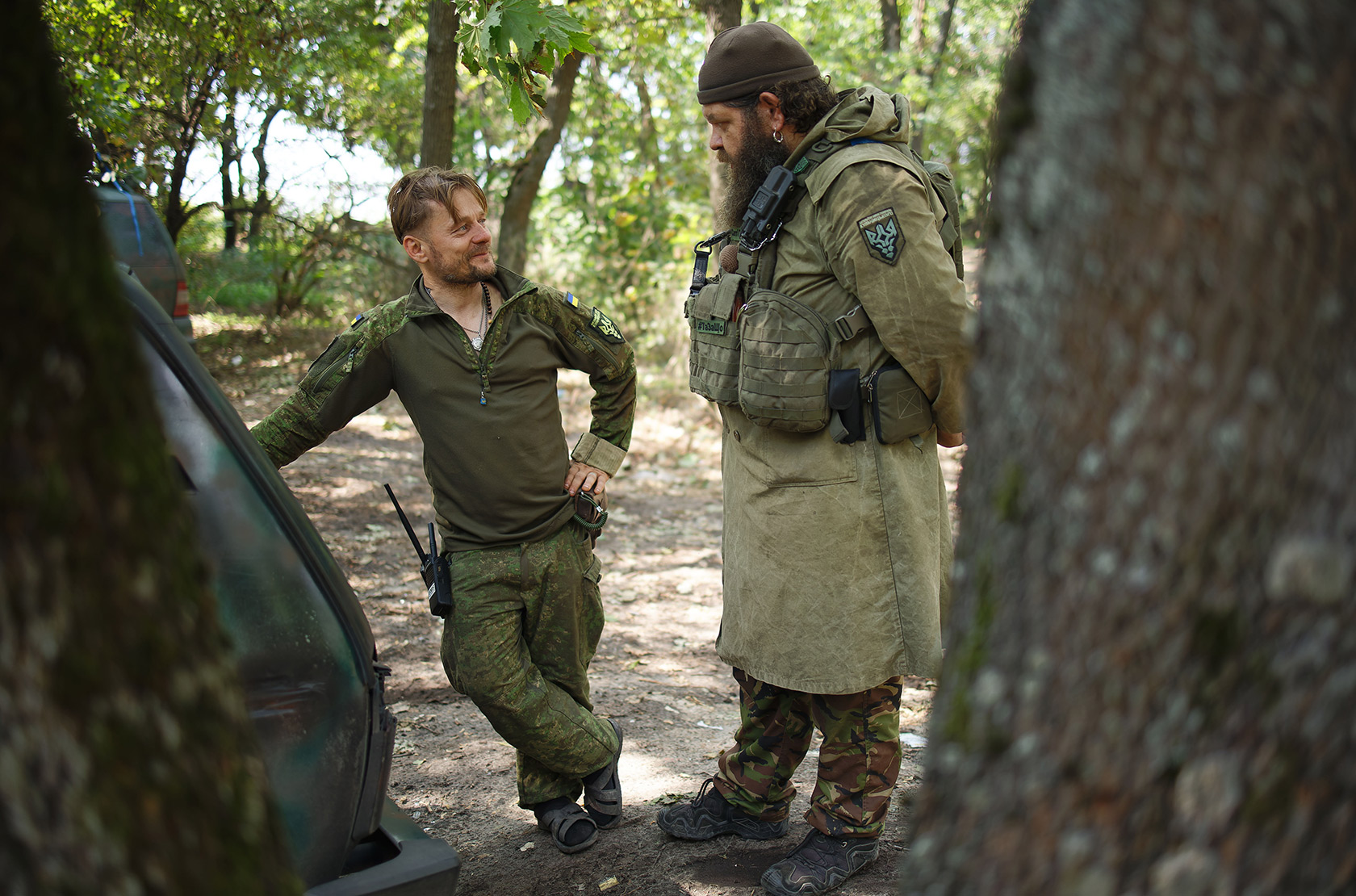
Late August 2022, the village of Tetianivka (Donetsk Oblast)
Two soldiers from the General Kulchytskyi Battalion, who go by the nicknames Haidamaka and Baton, during an overnight planning meeting.
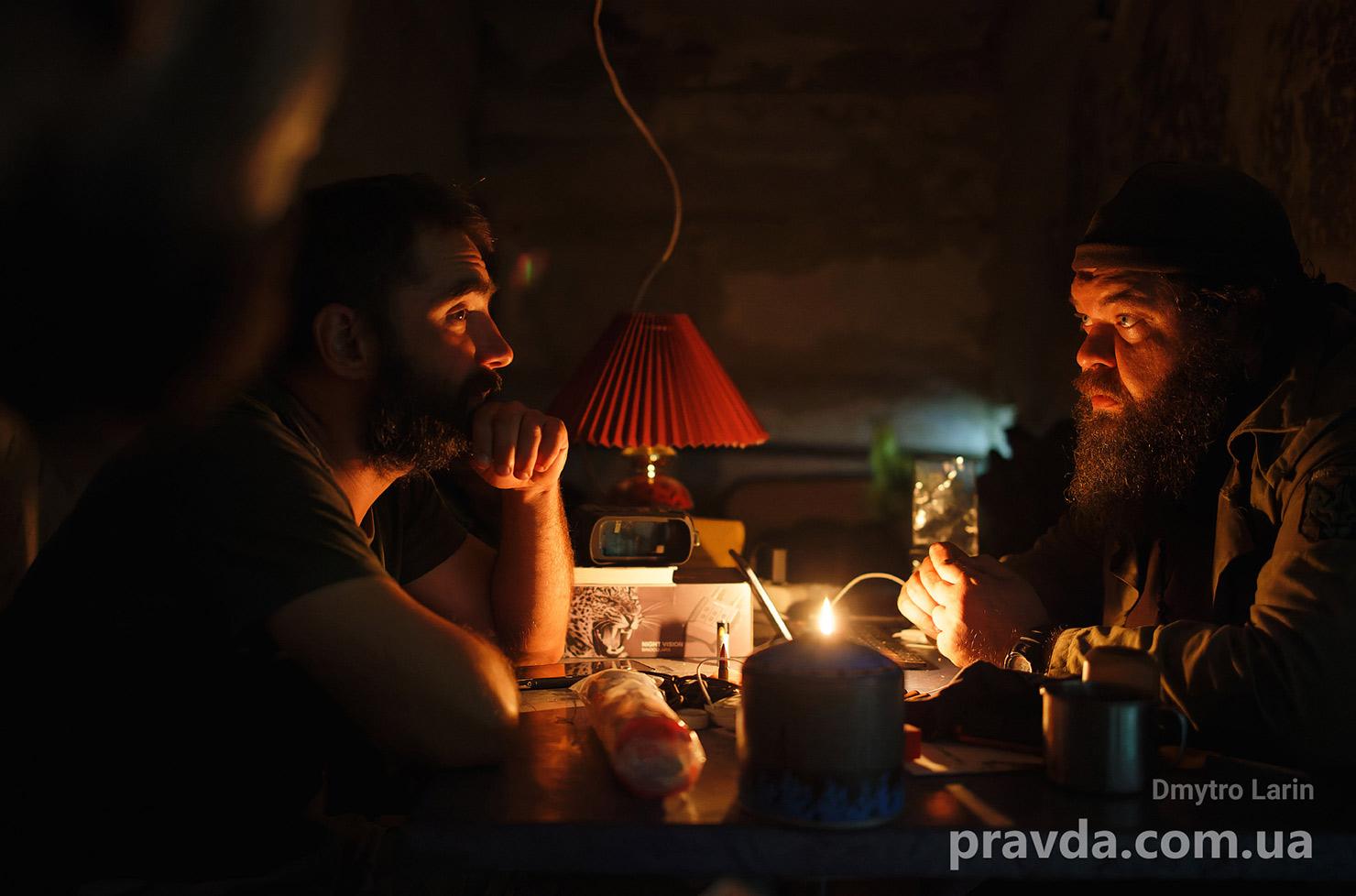
September 2022, Balakliia (Kharkiv Oblast)
On the day journalists arrived at the liberated city of Balakliia, forensic experts exhumed the bodies of two civilians; preliminary reports indicated the men were shot at a Russian checkpoint on 6 September.
Valentyna, the mother of one of the men, was crying as she watched the experts work.
"I am asking all of humanity: bring Putin to justice, impose the most terrible punishment upon him. Russians who believe him live in an empire of lies. He is always lying and he has come to us here in Ukraine with a terrible goal: to kill and destroy. He has killed my only son, and no one will ever be able to bring him back," the woman told journalists.
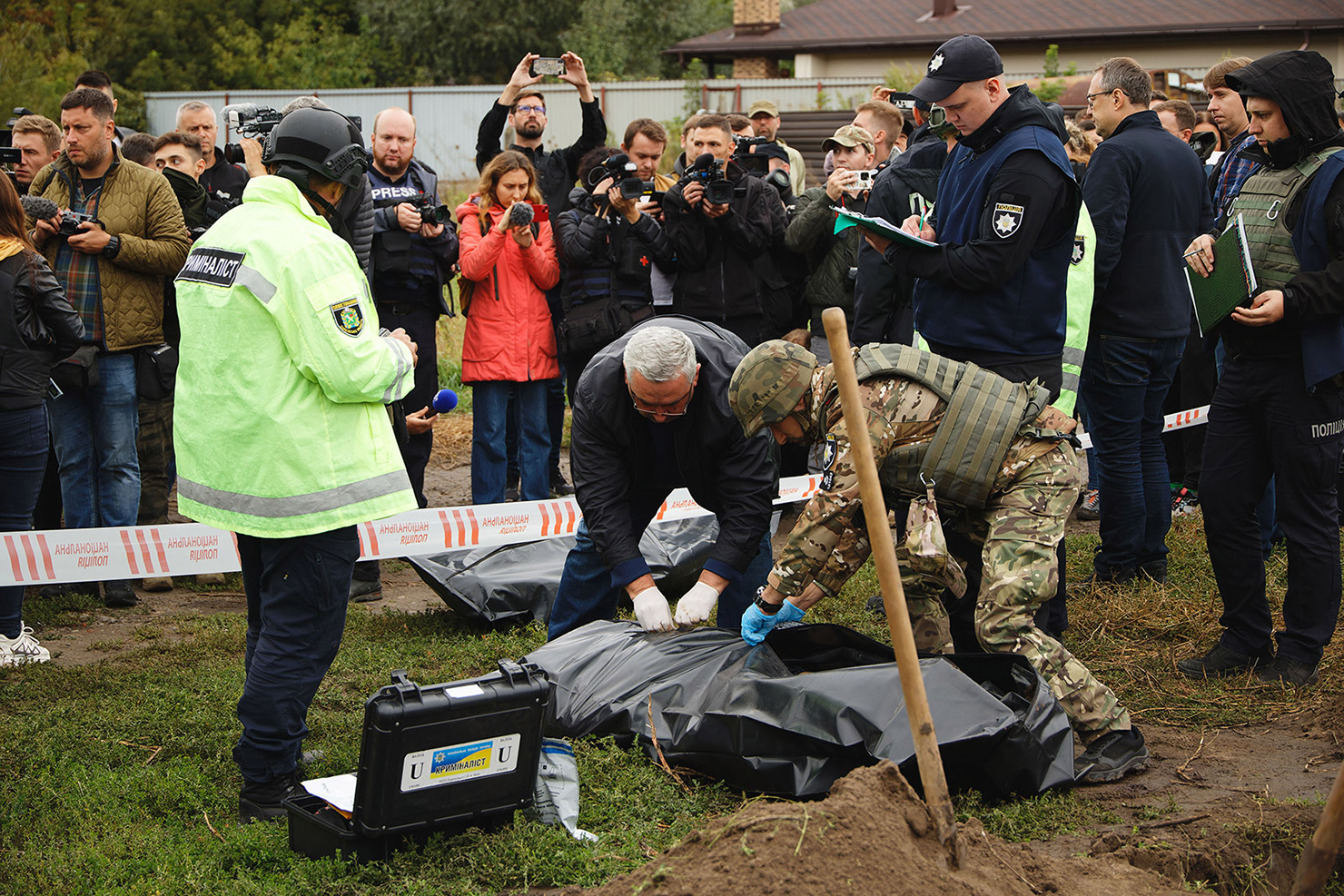
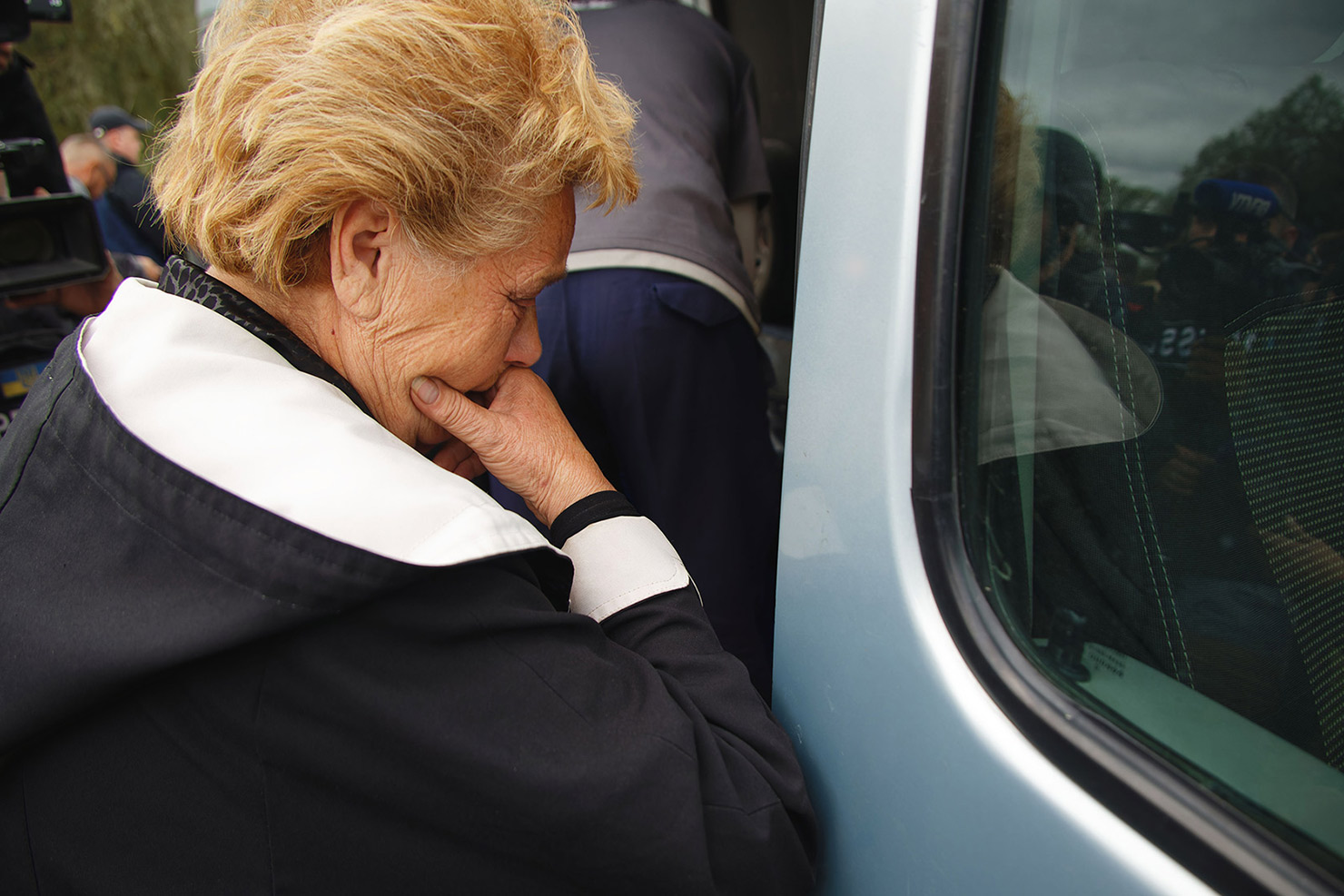
September 2022, Bakhmut front
Artillery gunmen from the 93rd ‘Kholodnyi Yar’ Brigade are firing on Russian positions using a 2S5 Giatsint (Hyacinth) self-propelled artillery system that was reclaimed from Russian forces. Soldiers from the battalion retrieved a 30-tonne heavy system from a Russian position on the Izium front during the successful Ukrainian counteroffensive in Kharkiv Oblast.
Soldiers jokingly refer to Russian equipment reclaimed in Kharkiv Oblast as ‘lend-lease’.
The 2S5 self-propelled artillery system has a 152 mm gun and a range of 28.5 kilometres. It is slightly more powerful than the 2S3 Akatsiia (Acacia) artillery system, which the crew pictured in the photo taken prior to capturing the Giatsint.
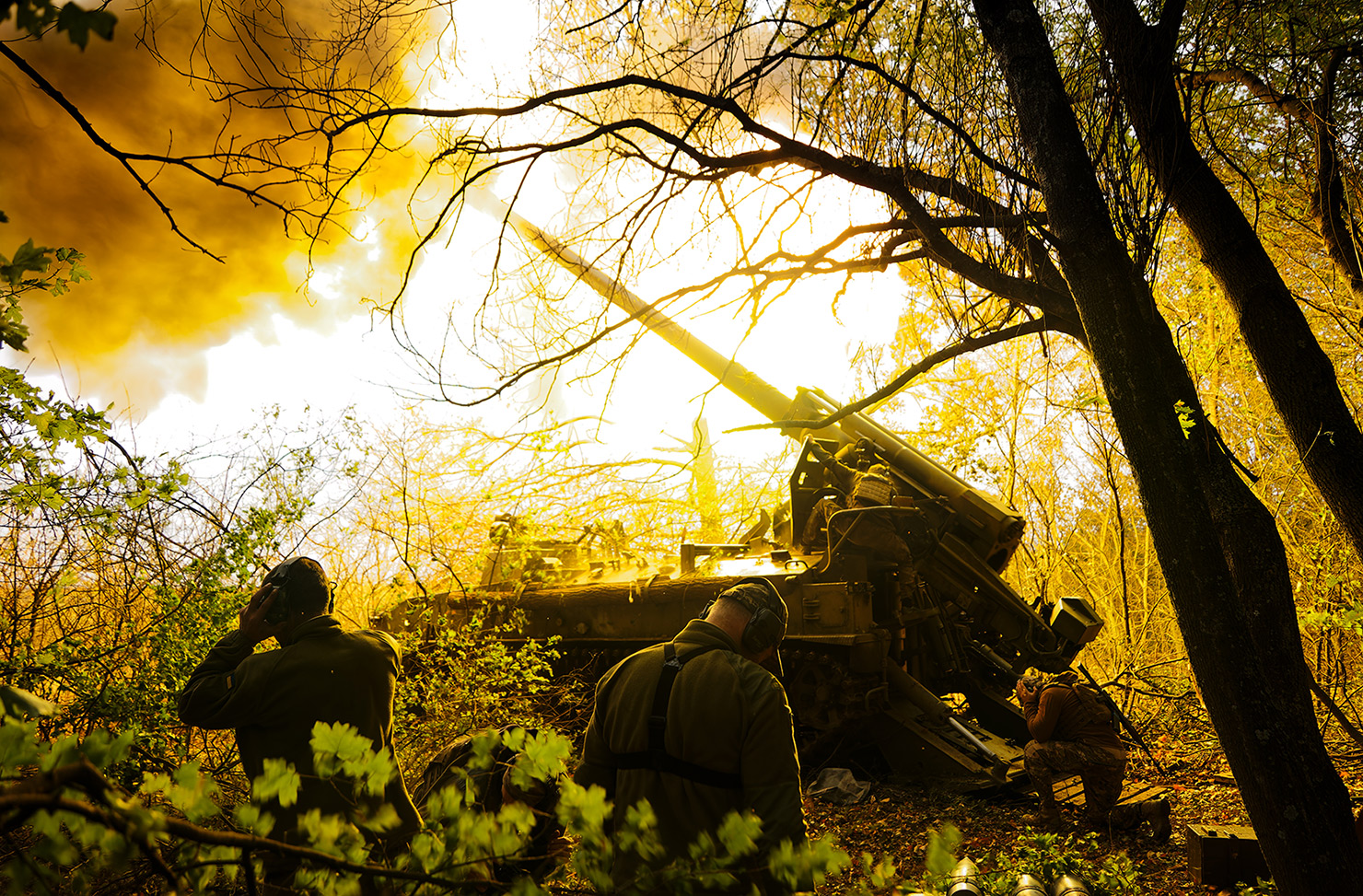
17 October 2022, Kyiv
Morning Kyiv, shrouded in smoke after the first attack by Iranian-made drones. Behind the soldiers, there is an infrastructure facility and a four-storey apartment block on Zhylianska Street.
The strike claimed the lives of five of the building’s residents, including a married couple, Vikotriia and Bohdan Zamchenko. Viktoriia was six months pregnant. A set of shelves of ‘wines beloved by Vika’ was installed in Good Wine, a grocery store in Kyiv where Viktoriia worked as a sommelier.
Kyiv Mayor Vitalii Klychko said that Russia launched 28 drones on Kyiv on the morning of 17 October. The majority of them were shot down, with only five reaching the capital.
Following the attack, the government urged Ukrainian civilians to refrain from trying to shoot down Russian drones.

Late October 2022, the village of Novoselivka (Donetsk Oblast)
A Ukrainian helicopter is returning to its base after conducting an attack on Russian positions in Donetsk Oblast.
Russian equipment destroyed by the Ukrainian army during the Donetsk Oblast counteroffensive in September 2022 is in the foreground of the picture. The equipment is positioned at the dam in the village of Novoselivka, which the Russian army used to retreat from that village to Drobysheve.
The Donetsk Oblast counteroffensive took place at the same time as the one in Kharkiv Oblast. Lyman was the key city in Donetsk Oblast that was liberated during that period, on 1 October 2022.
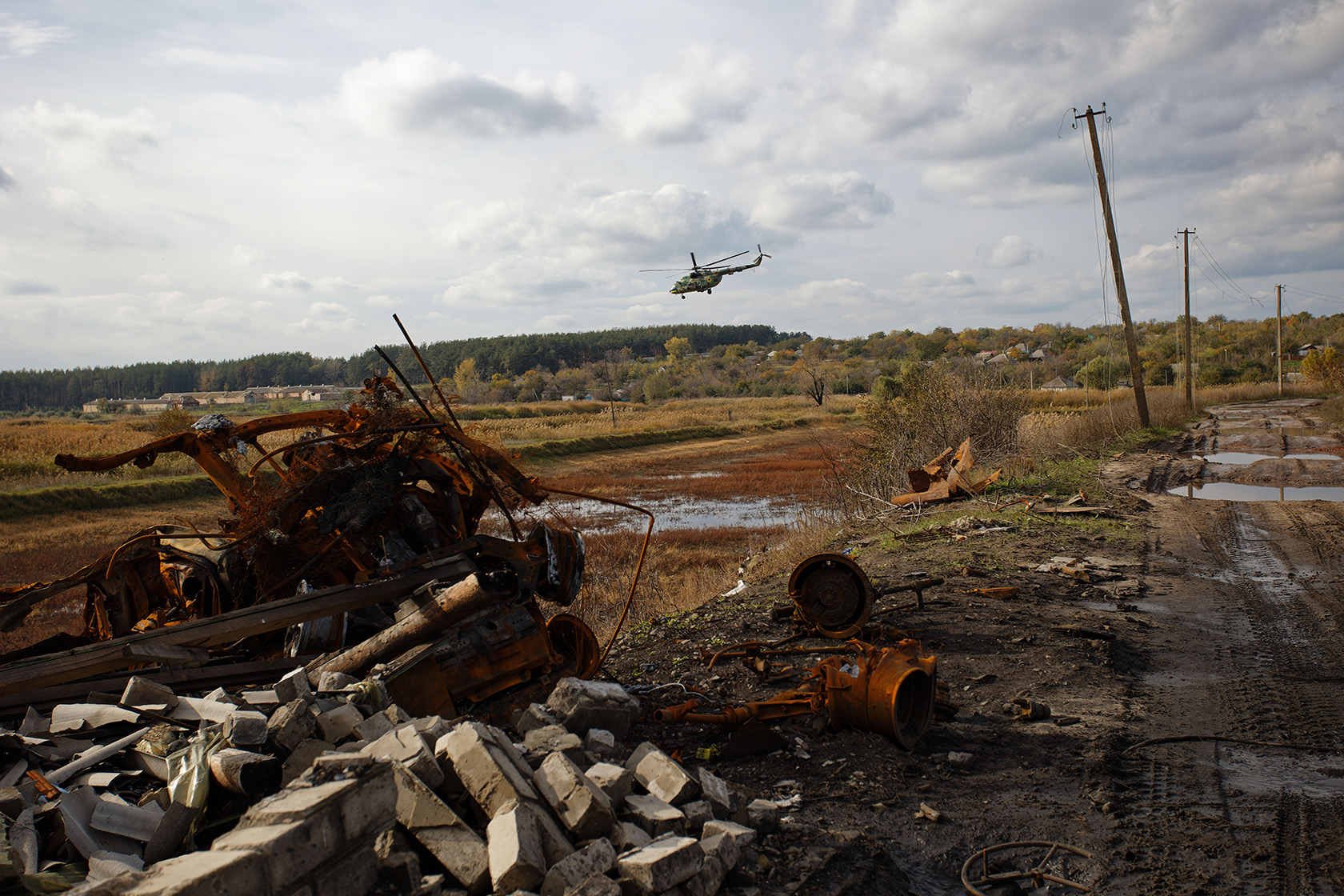
13 November 2022, Kherson (Kherson Oblast)
A Ukrainian soldier signs the national flag for a young kid amid a celebration of the liberation of Kherson three days after it happened. The atmosphere at the city’s central square, Freedom Square, recalled that of a patriotic festival: the locals were waving flags, reading the poems of Taras Shevchenko, a beloved 19th century Ukrainian poet, singing the famous Oi u luzi chervona kalyna folk song, and embracing military personnel with tears in their eyes.
President Zelenskyy’s video address, which has become known as "Without you", perfectly encapsulated the sentiment that prevailed in the liberated city. Kherson had had no mobile service or other communications for ten days prior to its liberation, but more than anything, its residents were relieved that the Russians were finally gone.
Kherson is currently being shelled relentlessly by the Russian army from the left bank of the River Dnipro.
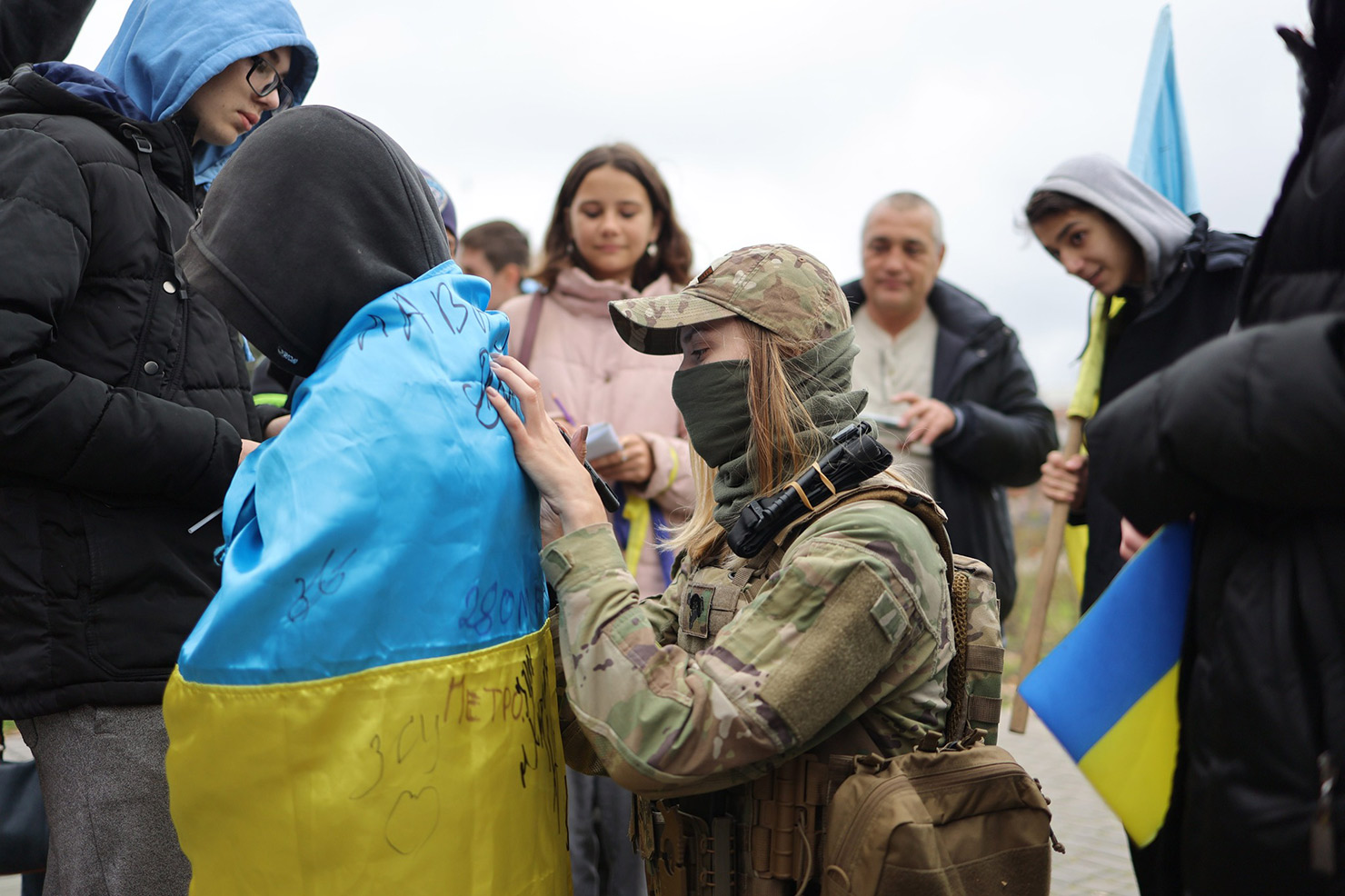
Dmytro Larin, Olha Kyrylenko, Ukrainska Pravda
Translation: Olga Loza
Editing: Monica Sandor
Journalists fight on their own frontline. Support Ukrainska Pravda or become our patron!
